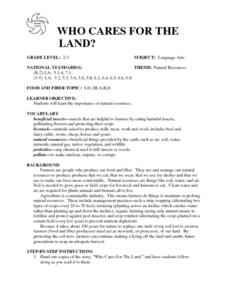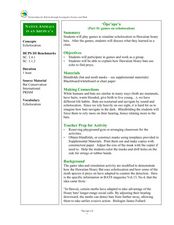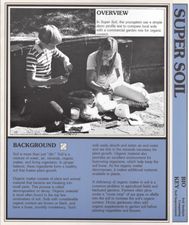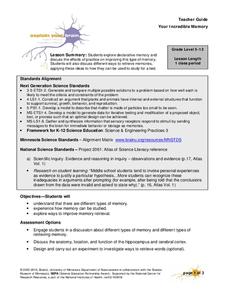Curated OER
Animal Food Chains
An engaging, informative, and colorful presentation focuses on food chains. Learners view many great photographs of animals, and must do some critical thinking regarding an animal's place in a food chain, and whether an animal is...
Curated OER
Sounds Like Great Science!
A phenomenal lesson on sound is here for your third graders! In it, learners engage in hands-on activities, watch video, take part in Internet activities, and complete tasks in cooperative groups in order to explore the world of sound...
Curated OER
What's in That Cake?
Cooperative groups research trip logs from deep-sea expeditions and explore characteristics of deepwater habitats. Using a cake as the ocean floor, they work together to decorate it as a model of such habitats. They also prepare a...
Curated OER
Who Cares for the Land?
A very thorough lesson plan focuses on what plants need to grow and stay healthy. There are excellent reading activities and worksheets included in this fine plan. A terrific way to introduce a unit on plants and their needs.
Curated OER
Fortified Breakfast
Students reverse engineer a cereal. In this dietary lesson students identify the minerals that the human body needs to function. Students examine how foods are fortified by food engineers. Students find the amount of iron in a cereal by...
Curated OER
Games on Echolocation
Get a little batty with life science! This fun simulation game replicates how bats use echolocation to hunt moths in their native Hawaiian habitat. After creating blind folds and discussing some basic principles of echolocation, students...
Curated OER
I Wonder How the Manduca Life Cycle Compares To the Human Life Cycle...
Students study life cycles including developing their understanding of the human life cycle. They decide where they are in the human life cycle and provide reasons for that placement. They compare the human life cycle to that of the...
Curated OER
Super Soil
Students compare the organic matter found in soil. In this soil lesson, students compare a commercial garden mix soil to their local soil and determine which has more organic material.
Curated OER
Water Works
Students create a "water web" to illustrate the interdependence among water users and producers. They distinguish between direct and indirect uses of water; illustrate the interconnectedness of water users in a community; and demonstrate...
Curated OER
Ornithology and Real World Science
Double click that mouse because you just found an amazing lesson! This cross-curricular Ornithology lesson incorporates literature, writing, reading informational text, data collection, scientific inquiry, Internet research, art, and...
Curated OER
TECH: Geneticist
A brief PowerPoint is used to introduce the class to the field of genetics by explaining the fields of work, the education required, and the job prospects. A trait inventory worksheet is completed by individuals, and then they gather...
Curated OER
Earth Day Number Sense
Elementary schoolers count and order objects using numbers 1-300. They bring recyclable items from home. Students group the items, skip count by 2's, 3's, and 5's, and arrange the items on a number line. Recyclable plastic bags are put...
Curated OER
Go Fish
Help learners discover methods to estimate animal population. They will participate in a simulation of catching and tagging fish in order to estimate the fish population. They scoop and count goldfish crackers, record data, and use...
Curated OER
Build Your Own Cell
In this building your own cell worksheet, students identify cell vocabulary and facts, and create posters of a labeled plant cell and an animal cell. In this fill-n-the-blank and posters worksheet, students provide twenty-three answers.
Curated OER
Lesson Plan: Plant Life Cycles
Young scientists view videos to watch the changes through the life cycle of a plant. Then they will germinate seeds on a sock and in a plastic bag. Finally, they answer questions about the sequence of plant growth and record changes in...
Curated OER
Can You Adapt?
Using the Montana State Quarter, learners engage in activities designed to help increase their understanding about how animals must change their social and physical behaviors in order to adapt to their environment. Excellent worksheets...
University of Minnesota
Inquiry Cubes
How do you teach kids to "science" effectively? Inquiry cubes are a "sort of" puzzle with no answer—promoting even more questions! Group members work together to use the evidence on the visible sides of each cube to infer what lies on...
University of Minnesota
Motor Learning and Memory
What do our brains have to do with reaction timing? Everything! In a hands-on learning activity, young scientists participate in four card activities that measure reaction timing. Each activity gets progressively more complex, and...
University of Minnesota
Close-up of the Nervous System
Make sure your class gets on your nerves! Learners of all ages practice peering into the nervous system to see what's inside. Groups examine prepared slides of mammalian nervous system tissues, all while gaining microscope skills. The...
University of Minnesota
Your Incredible Memory
Test the efficiency of your memory! Scholars test each other's memory as they explore factors that affect memory retrieval. Through experimental analysis, they discover there are different types of memory, which has an impact on the...
University of Minnesota
Bead Neuron
What do you call a skull without neurons? A no-brainer! A hands-on activity asks scholars to build a model of a neuron using beads. They use their models to study the parts of the neuron and their functions.
University of Minnesota
C. elegans and Alcohol
Investigate experimental design through a hands-on exploration. A creative lesson plan allows learners to design an experiment to monitor the effects of alcohol on the C. elegans worm. After conducting the experiment, individuals analyze...
University of Minnesota
Manduca sexta: Caterpillar Dissection
Caterpillars have an amazing, yet tough job to perform in their short lives — eat much, avoid predators, and try not to let all those comments about being the unattractive stage of the life cycle get to them. How do they handle it all?...
University of Minnesota
Neuropathfinding: Kinesthetic Model
Playing follow the leader has never been so interesting! Get the class up and moving while they take on the roles of nervous system components. Through trial and error, they learn the importance of the "pioneer" growth cone that leads...

























